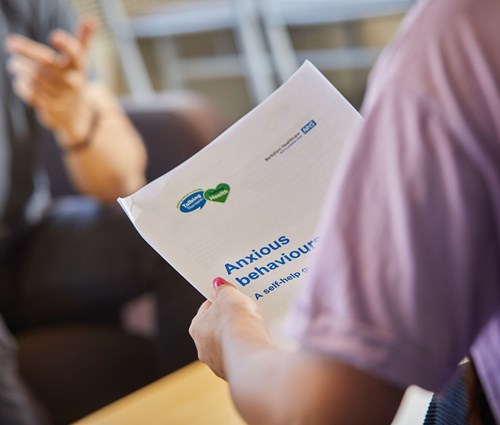Manage and overcome your stress, panic, anxiety and lack of motivation

Guided self-help workbooks
After your Wellbeing Assessment, our therapist will provide you with some workbooks. These will explain the different tools and techniques you can use for things like improving your mood.
Guided self-help may also help if you’re having difficulty with stress, panic, anxiety or lack of motivation.
Between your sessions you will be asked to follow a new section in your workbook and you will usually be asked to follow tasks and activities at home - such as a food or activity diary, setting goals and tasks, meditation or watching a video.
Your therapist will arrange regular call sessions with you, and talk through what you’ve been learning.
They’ll also set goals with you, and keep track of your progress. You can carry on with the learning activities at your own pace, and practice the different techniques in a space you feel most comfortable, such as your own home.
Find out more
- Our guided self help treatments are based on the principles of Cognitive Behavioural Therapy (CBT). Watch this one minute video from the BABCP (the organisation that leads on this therapy in the UK), narrated by Jo Brand, to find out more (opens in new browser tab)
Access to this type of therapy will depend on your needs.
If you feel that you need support, you can ask your GP to refer you to NHS Talking Therapies. We’ll offer a Wellbeing Assessment and offer the right therapy support to suit you.
You can also refer yourself to NHS Talking Therapies for a Wellbeing Assessment and find self-help guides if you want to know more about managing things like depression and stress.
Find out how to refer yourself to NHS Berkshire Talking Therapies (visit the webpage)
Guided Self-Help (GSH) FAQs
What is GSH?
Guided self-help is a form of low-intensity (LI) Cognitive Behavioural Therapy (CBT) where you will use workbooks and other resources to learn techniques to improve your mood and wellbeing. Your practitioner will help you build a toolkit of skills that you can use to maintain your wellbeing after your treatment comes to an end. You will agree tasks to complete between each session and review your progress with these in your session.
Who will I be working with?
You will be working with a therapist called a Psychological Wellbeing Practitioner (PWP). This includes qualified therapists and trainees working towards their postgraduate certificate.
Where do the sessions take place?
You may have opted for your first session to take place via telephone, video or face-to-face. Your subsequent sessions will take place via telephone or video, and you will agree this with your therapist in your first session.
How long will my sessions be and how many will I have?
Sessions will typically be 30 minutes long, but adjustments can be made if needed. You will have up to six sessions in total, though this can vary slightly depending on need.
How often will the sessions be?
Sessions typically take place once every two weeks, but this can vary e.g. if your therapist has annual leave, or if you are going on holiday. You should never have a gap of more than four weeks between your sessions.
What should I do if I can’t attend a session?
You should let your therapist know as soon as possible if you are going to be unable to attend a session, and ideally at least more than 48 hours before. Repeated short-notice cancellations or non-attendance of sessions without prior warning could result in you being discharged. You can contact your therapist by emailing them. You can also inform our Admin Team, who will pass on a message to your therapist, by calling them on 0300 365 2000 (option 2).
What should I do if I’m not finding it helpful?
If you feel your treatment is not working, for whatever reason, the best thing to do is let your therapist know as we would prefer you tell us rather than disengaging from treatment and not getting the support you need. They can explore your concerns with you and consider other options of support. We offer a range of different therapy formats, and we want to ensure we are supporting you in the best way possible, using the most appropriate form of support.